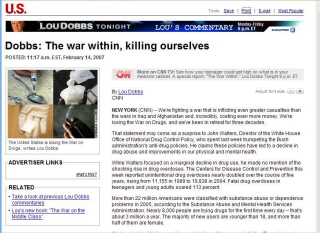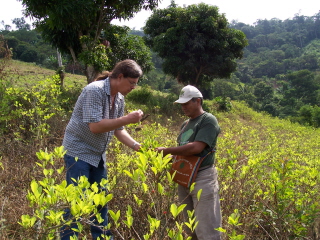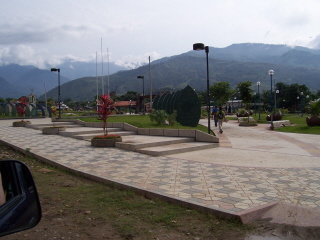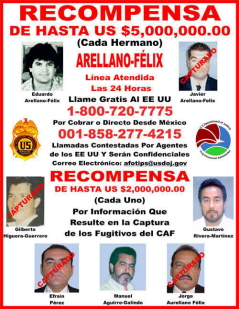CNN populist anchor Lou Dobbs wants the United States to commit to victory in the drug war. In an editorial modeled paragraph for paragraph after Dobbs' editorial, DRCNet executive director David Borden explains the real deal.
On the eastern slopes of the Andes, as the mountains edge down into the jungles of the Amazon, hundreds of thousands of Peruvian peasants are growing coca as a cash crop to survive. But they face considerable obstacles. Here is a first report from the region.
A DEA administrative law judge has ruled that a University of Massachusetts professor should be able to grow marijuana for research purposes, but the battle is not yet over.
The first study of the efficacy of treating pain with marijuana in at least 20 years has found significant benefits for HIV/AIDS patients.
A Colorado town wants to increase the penalties for simple marijuana possession, but a local judge's public stand has thrown the move into doubt.
A Texas Republican has reintroduced his bill that would legalize hemp farming in the United States. This time, a Democratic Congress will consider the measure.
Mexico's ruling party is pushing through a bill that would decriminalize possession of small amounts of drugs for first time offenders and "addicts" -- but may really be designed to facilitate that country's drug war by allowing state authorities to get more involved in it and lengthen sentences for traffickers.
Vancouver Mayor Sam Sullivan wants to start a pilot stimulant maintenance program for up to 700 hard-core cocaine and meth users in the city's Downtown Eastside. Now he has released a poll showing strong support for the idea among Vancouver residents.
Events and quotes of note from this week's drug policy events of years past.
Arch-drug warrior Mark Souder roasted by Tucker Carlson over TV ads, NORML's Paul Armentano on the cost of marijuana imprisonments, LEAP's Peter Christ in Florida, Tribute to LEAP's the late Eddie Ellison.
Arkansas Pregnancy Law, Kathryn Johnston
Support the cause by featuring automatically-updating Drug War Chronicle and other DRCNet content links on your web site!
A new way for you to receive DRCNet articles -- Drug War Chronicle and more -- is now available.
Visit our new web site each day to see a running countdown to the events coming up the soonest, and more.
[As part of a series of programs on the drug issue by the CNN show Lou Dobbs Tonight, populist broadcaster Lou Dobbs this week penned an editorial titled "The War Within, Killing Ourselves" -- a piece he concludes by demanding the nation commit to "victory" in the drug war. But informed observers of drug policy understand this to be an unachievable utopian fantasy based on flawed premises. David Borden, executive director of StoptheDrugWar.org, has written a response to Dobbs' piece that is modeled after it, paragraph by paragraph, but which tells the real deal.)]
WASHINGTON (Drug War Chronicle) -- We're fighting a war that is inflicting even greater casualties than the wars in Iraq and Afghanistan, and which over time has cost as much money. We're losing the War on Drugs. Actually, we've had it all wrong from the beginning.

Lou Dobbs on the drug war -- he just doesn't get it.
That we can't win the drug war is a truth you won't hear from John Walters, Director of the White House Office of National Drug Control Policy, who spent last week trumpeting the Bush administration's anti-drug policies. He claims these policies have led to a decline in drug abuse and improvements in our physical and mental health.
While Walters focused on a marginal decline in casual drug use, he made no mention of the shocking rise in drug overdoses. According to CNN anchor Lou Dobbs, "the Centers for Disease Control and Prevention this week reported unintentional drug overdoses nearly doubled over the course of five years, rising from 11,155 in 1999 to 19,838 in 2004. Fatal drug overdoses in teenagers and young adults soared 113 percent." Hundreds of heroin users died last year when a batch of heroin laced with the powerful synthetic opiate fentanyl worked its way through several major cities.
If drugs were legal, users would be less likely to overdose, because instead of buying drugs on the street, where purity can fluctuate wildly and the batch one obtains might be adulterated, they would get them from licensed, regulated distributors and manufacturers and would know what they were getting. It's not surprising that people like Walters or Dobbs wouldn't like such ideas. But short of ending prohibition, lives could be saved even now by making the overdose antidote naloxone widely available. Tragically, drug czar Walters has opposed even that.
Obviously, John Walters and Lou Dobbs aren't facing reality. There is simply no excuse for causing the destruction of so many young lives through these counterproductive prohibition laws.
How can anyone rationalize the fact that the United States, with only 4 percent of the world's population, holds 20 percent of the world's prisoners? More than half a million of our incarcerated are there for nonviolent drug offenses.
Drug prohibition was enacted 93 years ago, long before former President Richard Nixon called drugs "public enemy number one" and pushed through the Controlled Substances Act of 1970. Since then the government has waged a century-long war of aggression on its own people, but a futile one. Though supply-side enforcement strategies seek to discourage use by making drugs less available and therefore more expensive, measures of drugs' availability have gone in the wrong direction: Heroin, for example, sold for $329 per gram in 1981 but $60 per gram in 2003. Cocaine prices have dropped to a similar degree.
As Dobbs has pointed out, "more than two million inmates in our nation's prisons meet the clinical criteria for drug or alcohol dependence, and yet fewer than one-fifth of these offenders receive any kind of treatment" even though "studies show successful treatment cuts drug abuse in half, reduces criminal activity by as much 80 percent." Too bad we use up valuable treatment slots on people who aren't really addicted but get "referred" to treatment programs by the criminal justice system anyway, many of them mere casual users of marijuana.
In the midst of the global war on terror along with wars in Iraq and Afghanistan, illicit narcotics trafficking made possible by global drug prohibition is giving aid to our enemies through the easy, unregulated profits it makes available to them. We must repeal these abusive, self-destructive drug laws, while providing positive alternatives for youth, successful treatment for Americans struggling to beat addictions, and harm reduction programs like syringe exchange for those who are not yet ready to quit drugs.
Whatever course we follow in prosecuting other wars, we must commit ourselves as members of this great society to only one option in the War on Drugs -- victory through legalization.
Though Lou Dobbs calls legalization "ridiculous," the opinions expressed in this commentary are shared by many of the most thoughtful and respected people throughout the world including judges, attorneys general and heads of state.
back to top
On the eastern side of the Andes, where from their heights, the mountains drop down thousands of feet into the jungles (selva) of the Amazon basin, several hundred thousand Peruvian peasants are making a living -- but not much of one -- by growing coca. While the farmers and the coca leaf chewers they supply consider the plant sacred and an integral part of the culture of the Andes, it is also the stuff from which cocaine is made.

Chronicle editor Phil Smith with VRAE leader Abdon Flores Huaman
This makes Peru's coca farmers, or cocaleros, targets of the US government, which seeks to eradicate as much of the coca crop as possible. It also makes them targets of the Peruvian government, which, when it comes to drug policy, has shown itself all too willing to follow the lead of the gringos. While both governments and a host of non-governmental organizations are also seeking to provide alternative development opportunities to the cocaleros, those programs have failed to work and are rife with corruption, say cocalero leaders.
"We cocaleros are people who live in extreme poverty and we have to grow the sacred leaf to survive," said Nelson Palomino, head of the country's largest coca grower union, the National Confederation of Agricultural Producers of the Coca Valleys (CONCPACCP). "We are honest, hard-working Peruvians, and we are not guilty of anything for growing the coca plant to subsist," he told Drug War Chronicle during a meeting in Lima, chewing coca leaves as he spoke. "What are we to do? Alternative development has failed. The foreign money that is supposed to come to the valleys goes into the pockets of functionaries in Lima," Palomino complained. "We hope the world will understand that our intentions are good."
"The NGOs and the government are vampires," said Abdon Flores Huaman, secretary of the cocalero defense organization the Federation of Agriculture Producers of the Valleys of the Apurimac and Ene Rivers (VRAE), as he was interviewed in the CONCPACCP office in nearby Kimbiri on the banks of the rain-swollen Apurimac River. "They use our names to gain support for their so-called alternative development projects, but only 10% to 15% of those resources actually reach us," he claimed. "What we want is to get rid of these intermediaries that prey on us and get direct support for our local and regional authorities and directly to the campesinos, too. Our unions can play a role in this."

drying coca leaves for market -- about $60US
A Drug War Chronicle visit to the coca fields of the VRAE this week seemed to back up Palomino's contention that cocaleros are not getting rich, but merely surviving by harvesting the leaf. There, 125 miles down a dirt road over the crest of the Andes from Ayacucho, the nearest large city linked to the national highway system, tiny peasant villages where residents live in what are essentially shanties without electricity or running water depend on the coca leaf for what little income they can generate.
"Where are our narco-palaces?" asked Huaman scornfully. "Do you see any narco-palaces here? We are lucky to make $2,000 a year with four coca crops. That is barely enough to feed and clothe our children."
"We barely survive," said cocalero Percy Ore, as he stood in a small field tending his coca plants in the municipality of Pichari on the east bank of the Apurimac in Cusco province. "Look at this land," he said, pointing to the rugged, hilly terrain where he and his family toiled. "What else can we grow here? Coffee doesn't do well here, and if we try to grow fruits like the aid workers tell us, we have no way to get them to market."
Indeed. Even to get from his village to the nearest town requires a trek of several miles down a dirt road that only the toughest of four-drive vehicles can navigate during the rainy season. But cocaleros like Ore don't have four-wheel drive vehicles; they are more likely to carry their coca leaves to the local market on burros or on their own shoulders. Numerous peasants could be seen walking down the road in Pichari carrying their bags of coca leaves to local markets.
In the VRAE alone, Huaman said, there are some 40,000 coca growers. While about 9,000 of them are registered with ENACO, the Peruvian government coca monopoly that handles all legal buying and selling, the remaining 30,000 are not. Cocalero leaders consistently insist their crops are not ending up as cocaine, but cocaleros acknowledge off the record that the leaves not bought by ENACO are destined for the black market.
The situation does not sit well with the cocaleros. "We want to be legal," said Pastor Romero Castillo, subsecretary of the VRAE federation. "We reject the narco-traffic."
For the leadership, what is crucial is to separate coca, "the sacred leaf," from cocaine, the drug that afflicts the gringos as well as some of their urban countrymen. "Coca is our culture; coca is Peru," Palomino said fiercely. "To talk about coca is to talk about health. The coca needs to go for medicine, food, and other uses. Why can't the rest of the world accept this? The coca plant contains many alkaloids. While some are bad, others are good, and we worry that your country does not know about the good side of coca. We need for the American press, the American Congress to know this information."
What coca growers need is true alternative development, an agricultural policy that addresses their needs, and an increase in legal markets for their product, say the cocaleros. Some Peruvian entrepreneurs are working hard to do just that.
"Although there is abuse, the coca leaf is natural," said Manuel Seminario Bisso, the entrepreneur behind Mana Integral, a Lima-based company producing coca products as well as products based on other native Peruvian plants, including maca, tarwi, kiwicha, quinua [Editor's Note: "quinoa" on US store shelves], and kaniwa. "We want to revalorize the coca leaf, and we are investigating various products. Already, we make products like coca flour, tea, and other coca products for food. We use it in tamales, we have lemonade with coca [Editor's Note: Very tasty and refreshing]; it is one of the best foods we could use."
"There have been 45 years of aggression against the coca plant since the UN Single Convention in 1961," said Seminario. "We have seen the results of this stupid, stupid policy of eradication. We don't need eradication; we need to develop alternative uses, alternative markets. Holding up a display pack of coca flour energy packets ("Energize Yourself! Eat Coca! [coca flour] Without caffeine or taurine: Pure Cocaâ¦our sacred plant) that wouldn't look out of place at the check-out counter of your local convenience store, Seminario argued that if the market for coca as a food item could expand, there would be no need to eradicate crops. "It's very simple to solve this problem," he said. "If everyone in Peru ate 12 grams of this leaf every day, we would use up the entire crop. We like to say 'a coca leaf eaten is one coca leaf less for the drug trade.'"
But Seminario bemoaned a variety of problems facing an expanded coca food industry. "It is difficult to sell coca products and there is a lot of prejudice against them because they demonize it. They say that coca is a drug, and it's my job to convince people that it has benefits. We must revalorize the plant."

statues of coca leaves, Municipal Park, Pichari
Coca product producers also face higher prices from ENACO, the Peruvian state coca monopoly through which all legal coca must be bought and sold. "ENACO has raised prices dramatically for no good reason. It is a bid to end production increases. ENACO sets the prices, and that's the problem with having a monopoly like that. We need a free market. The government talks about the free market and globalization, but they want to control the market," Seminario complained.
And it isn't just the Peruvian government that is the problem, according to Seminario. "The United States government needs to quit bothering us. We want to sell these products, and it is allowed in Peru," he said. "We don't need to sell it to the rest of the world. It is not the coca that kills or produces corruption, so please just leave us alone and respect our nutritional sovereignty. The US needs to stop defaming our product and trying to undermine us."
[Editor's Note: This first article based on the Drug War Chronicle's visit to the Andean coca heartland provides only a first glimpse of a number of complex issues related to coca, cocaine, and the drug trade. Look for more in-depth articles on the politics of the cocalero movement in Peru, as well as reporting from Bolivia in coming weeks.]
back to top
A Drug Enforcement Administration (DEA) administrative law judge ruled Monday that a professor at the University of Massachusetts at Amherst should be allowed to grow marijuana for research purposes. The ruling is non-binding, and the decision resides ultimately in the hands of DEA head Karen Tandy, but the decision by Judge Mary Ellen Bittner paves the way for Professor Lyle Craker, a horticulturist specializing in medicinal plants, to possibly become the second authorized grower of marijuana for research purposes in the United States.

Lyle Craker (courtesy aclu.org/drugpolicy/)
Currently, only a long-standing government-approved program at the University of Mississippi can legally grow marijuana for research purposes. But Craker and others have long argued that marijuana from the Mississippi garden is neither readily available nor of sufficient quality and strength to be useful for researchers.
Craker first applied to the DEA for permission to grow marijuana for research purposes in 2001 and won the support of home state senators Edward Kennedy and John Kerry for the project. But for years, the DEA refused to act on the request, and in 2004, Craker and the Multidisciplinary Association for Psychedelic Studies (MAPS) sued the agency, charging it with unreasonable delays in dealing with his application.
After hearings last year, the agency responded by denying his application, saying that there was no shortage of marijuana for research purposes, and Craker and his private backers were free to submit bids to compete for the marijuana-growing contract. But Craker and MAPS vehemently disagreed and sought a ruling by a DEA administrative law judge.
In her Monday ruling, Judge Bittner found that Craker's bid to grow marijuana "would be in the public interest." Her opinion noted that: "There would be minimal risk of diversion of marijuana. There is currently an inadequate supply of marijuana available for research purposes... [and] competition in the provision of marijuana for such purposes is inadequate."
While the decision is not definitive -- the DEA has 20 days to respond, and it may ignore the judge's findings -- Professor Craker and MAPS greeted the decision with guarded optimism. "This ruling is a victory for science, medicine and the public good," said Craker in an MAPS press release. "I hope the DEA abides by the decision and grants me the opportunity to do my job unimpeded by drug war politics."
"For decades, politicians have said that marijuana has no proven medical value while scientists have been denied the ability to prove otherwise," said Rick Doblin, PhD, president and founder of MAPS.
The American Civil Liberties Union Drug Law Reform Project, which helped argue the case, also pronounced itself pleased with the ruling. "For too long the DEA has inappropriately inserted politics into a regulatory process that should be left to the FDA and medical science," said Allen Hopper, an attorney with the project, in a press release. "We are pleased that the judge has recommended an end to the federal government's blockade of medical marijuana research."
The DEA has refused to comment on the ruling so far, but, as noted above it is non-binding. Optimism over the ruling is tempered by the memory of DEA's administrative law Judge Francis Young's 1988 finding that marijuana is among the most benign therapeutic substances known to man. That ruling came in a bid to reschedule marijuana as a prescription medicine, but was ignored by the agency.
"I hope that Administrator Tandy abides by the decision and grants me the opportunity to do my job unimpeded by drug war politics," Craker said.
There is strong support for Craker and MAPS's bid to grow their own marijuana to do DEA- and FDA-approved research on the medicinal uses of marijuana. Prior to this week's ruling, organizations that had already written to DEA in favor of Prof. Craker's application included the Multiple Sclerosis Foundation, the Lymphoma Foundation of America, the National Association for Public Health Policy, the United Methodist Church, Americans for Tax Reform, the American Medical Students Association, several state nurses' associations, the Massachusetts Dept. of Public Health, Massachusetts Senators Kerry and Kennedy, 38 members of the US House of Representatives, and the California and Texas State Medical Associations, the two largest US state medical associations.
Now, it is time to keep the pressure on.
back to top
A study by researchers at the University of California-San Francisco led by Dr. Donald Abrams has found that marijuana provides significant relief to people suffering from neuropathic pain. The study was the first of its kind in the United States for nearly 20 years, and provides new ammunition for proponents of medical marijuana as they seek action from Congress on the issue.
Up to four million US residents suffer from neuropathic pain, including many HIV/AIDS patients. According to the National Association of People With AIDS (NAPWA), as many as 37% of HIV/AIDS patients already use marijuana to treat neuropathic pain and other symptoms of the disease.
"This study validates the experience people living with HIV/AIDS and their doctors have reported for years -- medical cannabis provides much-needed relief from pain and suffering." said NAPWA Executive Director Frank Oldham Jr. "That is why we are joining Americans for Safe Access to call on Congress to address cannabis for its medicinal value."
The study, conducted between 2003 and 2005 at a San Francisco hospital looked at 50 HIV/AIDS suffering from foot pain, or peripheral neuropathy. Half of the subjects received marijuana, while the other received placebos. More than half the subjects using marijuana reported reductions in pain.
"I have been living with HIV/AIDS for 21 years and owe my life to the benefits of medical cannabis," said UCSF study participant Diana Dodson. "It reduces the pain and side-effects such as nausea and stomach pains that are caused by the drugs I need to take in order to stay alive. But I need the government to grant me safe access to my medicine."
"This study demonstrates the potential effectiveness of medical cannabis to treat the chronic pain of people living with HIV/AIDS," said Dr. Barbara T. Roberts, Director of Medical and Scientific Affairs for Americans for Safe Access and former Senior Policy Analyst at the White House Office of National Drug Control Policy. "In addition to people living with HIV/AIDS, there are thousands of vets returning from Iraq who will spend decades coping with neurological pain. By implementing the recommendations of the IOM report, the federal government would be exploring more options for their long-term treatment of neuropathic pain."
The groups are calling on Congress to hold hearings on the IOM report to adopt its recommendations to allow patients and researchers to have access to medical cannabis. "It's time for Washington to stop playing politics with patients' lives and advance this important scientific discovery," said Steph Sherer, Executive Director of Americans for Safe Access. "The study is a wake-up call for Congress to hold hearings to investigate therapeutic use and encourage research."
back to top
BREAKING: We've just been informed that the town council has withdrawn the ordinance -- victory, at least for now, they will revisit the issue at a meeting April 3rd. Check the Speakeasy for more info shortly.
An associate municipal court judge in the Colorado town of Lafayette has resigned his position in protest of the city's preliminary harsh new penalties for marijuana possession. Judge Leonard Frieling, who is also a Boulder criminal defense attorney, had served in the position for the past eight years.

Leonard Frieling
Frieling said he could not remain as a municipal court judge because he was
unwilling to enforce a new ordinance that would raise the fine for possession of small amounts of marijuana from $100 to $1,000 and a year in jail. Under Colorado state law, possession of under an ounce of marijuana has been decriminalized and those caught with pot face only a $100 fine.
The measure isn't a done deal yet. The Lafayette City Council gave preliminary approval to the ordinance last week, but a final vote isn't set until next week.
Frieling resigned anyway, saying since he doesn't want to enforce the law, he is ethically and morally unable to remain on the bench. Frieling also said he doesn't think marijuana should be illegal, but should instead be treated like alcohol, but he could live with the current $100 fine.
The move has drawn significant media attention to the council vote, with outlets covering it including the state's largest newspapers and television stations. Not all of the coverage has been accurate -- Frieling had to issue a press release on Wednesday to debunk claims that he was no longer a judge at the time he announced his resignation.
(Frieling has signed up as DRCNet's latest guest blogger. Click here to read Frieling's Wednesday press release and here for some further comments from Frieling.)
back to top
Texas Republican Congressman Ron Paul has filed a bill that would legalize hemp farming in the United States. This marks the second time Rep. Paul has filed this bill, but it went nowhere in the last Congress. The bill, HR 1009, would allow domestic hemp manufacturers to buy their hemp from American producers. Currently, US law bars the production of industrial hemp, and American manufacturers have to import their hemp from other countries.

Ron Paul
This time around, Rep. Paul has nine cosponsors, all Democrats. They are Representatives Tammy Baldwin (D-WI), Barney Frank (D-MA), Raul Grijalva (D-AZ), Maurice Hinchey (D-NY), Dennis Kucinich (D-OH), Jim McDermott (D-WA), George Miller (D-CA), Pete Stark (D-CA) and Lynn Woolsey (D-CA).
"It is indefensible that the United States government prevents American farmers from growing this crop. The prohibition subsidizes farmers in countries from Canada to Romania by eliminating American competition and encourages jobs in industries such as food, auto parts and clothing that utilize industrial hemp to be located overseas instead of in the United States," said Rep. Paul. "By passing the Industrial Hemp Farming Act, the House of Representatives can help American farmers and reduce the trade deficit -- all without spending a single taxpayer dollar."
Hemp food manufacturers such as French Meadow Bakery, Hempzels, Living Harvest, Nature's Path and Nutiva now make their products from Canadian hemp. "Under the current national drug control policy, industrial hemp can be imported, but it can't be grown by American farmers," says Eric Steenstra, President of Vote Hemp. "The DEA has taken the Controlled Substances Act's antiquated definition of marijuana out of context and used it as an excuse to ban industrial hemp farming. The Industrial Hemp Farming Act of 2007 will bring us back to more rational times when the government regulated marijuana, but told farmers they could go ahead and continue raising hemp just as they always had," said Steenstra.

hemp plants
The introduction of the hemp bill comes just days after North Dakota issued the first state licenses for farmers to grow hemp. But North Dakota hemp farmers must still win approval from the DEA, something that is unlikely to occur under the current law. North Dakota isn't alone. Some 14 other states have passed pro-hemp measures and seven have passed bills that remove barriers to its production or research.
back to top
Legislators from Mexican President Felipe's Calderon's National Action Party (PAN -- Partido de Accion Nacional) have introduced a bill in the Mexican Senate that would decriminalize the possession of small amounts of drugs for "addicts." An even stronger drug reform bill that included higher personal drug possession limits and would have applied to all drug consumers passed both the Mexican Senate and Congress, only to be vetoed by then President Vicente Fox after strong objections from Washington.

DEA Spanish-language poster targeting Mexican trafficking organization
Under this year's version of the bill, which was introduced in the Senate Wednesday, people caught for the first time with less than two grams of marijuana and similarly small single-dose amounts of other drugs, such as cocaine and methamphetamine, would not be prosecuted. But persons caught more than once in possession of illegal drugs would be prosecuted unless they qualified as "addicts" by proving they were in drug treatment or under medical care. The bill retains a provision that would protect indigenous people engaging in religious drug use from prosecution.
But the proposed legislation may not mark a liberalization of Mexico's drug policy, but may instead broaden Mexico's ability to arrest and prosecute drug offenders by allowing state police and judicial systems to take action against drug offenders under them. Under current law, that ability is reserved to the federal government. The bill would allow authorities to concentrate on drug traffickers by freeing up resources to go after dealers, and it increases prison sentences for drug trafficking offenses.
"This isn't legalization," said PAN Sen. Alejandro Gonzalez, who heads the Senate's justice commission. "We're going to go much harder against drug dealers," he told a Mexico City press conference Monday.
Since taking office in December, President Calderon has declared war on Mexico's violent drug trafficking organizations with a vengeance. He has sent thousands of troops into hotbeds of drug trafficking, such as the state of Michoacan, as well as major cities plagued by prohibition-related violence and corruption, such as Tijuana and Acapulco.
Last year's version of the bill set higher personal use quantities, causing it to ultimately be vetoed, said Gonzalez. "An error was made, unfortunately, in the lower house, adding the (exemption for) consumers. That really betrayed the spirit of the reforms, by increasing (personal use) quantities, and that's why we're paying attention to the criticisms and making changes," he noted.
Is "the spirit of the reforms" then to facilitate Mexico's drug war rather than end it?
back to top
Vancouver Mayor Sam Sullivan, who wants to begin a groundbreaking plan to provide cocaine and methamphetamine users with prescription stimulants, has released the results of a poll he commissioned that showed strong support for the notion among Vancouver residents. The survey released last Friday showed that 61% of respondents would support such a program to deal with rampant drug abuse in the city's Downtown Eastside.
The mayor needs to win an exemption from Canada's drug laws from the federal government. Under Sullivan's plan, called CAST (Chronic Addiction Substitution Treatment), up to 700 chronic cocaine and meth users would be provided with maintenance doses of stimulants. The release of the poll results is designed to increase pressure on the federal government to approve the experimental program.
The poll also found that an even larger majority of Vancouver residents were skeptical of traditional abstinence-based drug treatment programs. According to the poll, 71% of respondents believed such programs actually worked for less than one-quarter of participants.
"The public appears to be aware that large numbers of addicted people will continue to be involved in crime and disorder as a result of long-term drug use," Sullivan said in a press release last Friday. "We know that many drug users do not respond, in the long term, to traditional abstinence-based treatment programs."
back to top
February 21, 1971: The United States joins with other countries in signing the international Convention on Psychotropic Substances, in Vienna, Austria.
February 16, 1982: During a speech in Miami, Florida, George H. W. Bush promises to use sophisticated military aircraft to track the airplanes used by drug smugglers. By June, airborne surveillance time was running a mere 40 hours per month, not the 360 hours promised by Bush, prompting Rep. Glenn English to call hearings on this topic. By October, the General Accounting Office issued an opinion in which it found "it is doubtful whether the [south Florida] task force can have any substantial long-term impact on drug availability."
February 17, 1997: Legislation to repeal an 18 year-old state law permitting physicians to prescribe marijuana for patients suffering from cancer or glaucoma is voted down by a Virginia Senate committee in a 9-6 vote.
February 20, 1997: CNN reports that a prestigious panel of experts convened by the National Institutes of Health said there is promising evidence that smoking marijuana may ease the suffering of some seriously ill patients.
February 18, 1999: Dr. Frank Fisher, a pain doctor from Northern California, is arrested and charged with five counts of murder. After about six years of legal wrangling and having more charges levied against him, he is determined to be completely innocent.
February 18, 2000: President Clinton signs the "Hillary J. Farias and Samantha Reid Date-Rape Drug Prohibition Act of 2000," categorizing GHB as a Schedule I drug.
February 22, 2000: Due to drug-related violence, the US State Department issues a traveler's advisory warning for Tijuana, México City, and Ciudad Juárez, which are labeled as "dangerous." Juárez Mayor Gustavo Elizondo protests to US Secretary of State Madeleine Albright.
February 21, 2001: The New York Times reports that a recent study released at a World Health Organization meeting found that American teens are more likely to smoke marijuana and use other illicit drugs than their European counterparts. While they are more likely to smoke cigarettes and drink alcohol, only 17 percent of European 10th graders reported marijuana use, compared to 41 percent of American 10th graders. The study is interesting considering the US implements a zero-tolerance approach while many European countries tend to employ harm-reduction strategies and are generally more tolerant.
February 19, 2004: Veterans and medical marijuana activists in San Francisco hold a protest/rally in front of San Francisco's Veterans Administration Outpatient Clinic and ask doctors working for the Veteran's Administration to help provide better access to medical marijuana.
back to top
MSNBC's Tucker Carlson roasts Congressional arch-drug warrior Mark Souder over increased funding for a TV "anti-drug campaign that studies suggest actually increases drug use among teens."
In a loss to the movement, LEAP activist and former Scotland Yard drug chief Eddie Ellison lost his battle to cancer and passed away this week. Read a tribute by the UK's Transform here and check back at the Transform blog for repostings of Ellison's writings and speeches. Visit Ellison's web site here.
Pot Prisoners Cost Americans $1 Billion a Year, NORML's Paul Armentano on Alternet
TV news footage and poll on LEAP speaker Peter Christ in Florida
back to top
Last week's article on the new Arkansas law relating to pregnancy and drug use implied that the law is now part of the state's criminal code. While the law certainly has a highly punishing effect, it actually is part of the state's civil code.
One of our two articles last week on the advocacy and legal developments in Atlanta in the aftermath of the Kathryn Johnston tragedy reported Mrs. Johnston's age as 88, while the other reported it as 92. Both of these numbers have appeared multiple times in the mainstream media, but we intended to report the age as 92 in both articles.
back to top
Are you a fan of DRCNet, and do you have a web site you'd like to use to spread the word more forcefully than a single link to our site can achieve? We are pleased to announce that DRCNet content syndication feeds are now available. Whether your readers' interest is in-depth reporting as in Drug War Chronicle, the ongoing commentary in our blogs, or info on specific drug war subtopics, we are now able to provide customizable code for you to paste into appropriate spots on your blog or web site to run automatically updating links to DRCNet educational content.
For example, if you're a big fan of Drug War Chronicle and you think your readers would benefit from it, you can have the latest issue's headlines, or a portion of them, automatically show up and refresh when each new issue comes out.
If your site is devoted to marijuana policy, you can run our topical archive, featuring links to every item we post to our site about marijuana -- Chronicle articles, blog posts, event listings, outside news links, more. The same for harm reduction, asset forfeiture, drug trade violence, needle exchange programs, Canada, ballot initiatives, roughly a hundred different topics we are now tracking on an ongoing basis. (Visit the Chronicle main page, right-hand column, to see the complete current list.)
If you're especially into our new Speakeasy blog section, new content coming out every day dealing with all the issues, you can run links to those posts or to subsections of the Speakeasy.
Click here to view a sample of what is available -- please note that the length, the look and other details of how it will appear on your site can be customized to match your needs and preferences.
Please also note that we will be happy to make additional permutations of our content available to you upon request (though we cannot promise immediate fulfillment of such requests as the timing will in many cases depend on the availability of our web site designer). Visit our Site Map page to see what is currently available -- any RSS feed made available there is also available as a javascript feed for your web site (along with the Chronicle feed which is not showing up yet but which you can find on the feeds page linked above). Feel free to try out our automatic feed generator, online here.
Contact us for assistance or to let us know what you are running and where. And thank you in advance for your support.
back to top
RSS feeds are the wave of the future -- and DRCNet now offers them! The latest Drug War Chronicle issue is now available using RSS at http://stopthedrugwar.org/chronicle/feed online.
We have many other RSS feeds available as well, following about a hundred different drug policy subtopics that we began tracking since the relaunch of our web site this summer -- indexing not only Drug War Chronicle articles but also Speakeasy blog posts, event listings, outside news links and more -- and for our daily blog postings and the different subtracks of them. Visit our Site Map page to peruse the full set.
Thank you for tuning in to DRCNet and drug policy reform!
back to top
With the launch of our new web site, The Reformer's Calendar no longer appears as part of the Drug War Chronicle newsletter but is instead maintained as a section of our new web site:
- Visit http://stopthedrugwar.org each day and you'll see a listing of upcoming events in the page's righthand column with the number of days remaining until the next several events coming up and a link to more.
- Check our new online calendar section at to view all of them by month, week or a range of different views.
- We request and invite you to submit your event listings directly on our web site. Note that our new system allows you to post not only a short description as we currently do, but also the entire text of your announcement.
The Reformer's Calendar publishes events large and small of interest to drug policy reformers around the world. Whether it's a major international conference, a demonstration bringing together people from around the region or a forum at the local college, we want to know so we can let others know, too.
But we need your help to keep the calendar current, so please make sure to contact us and don't assume that we already know about the event or that we'll hear about it from someone else, because that doesn't always happen.
We look forward to apprising you of more new features on our web site as they become available.
back to top









